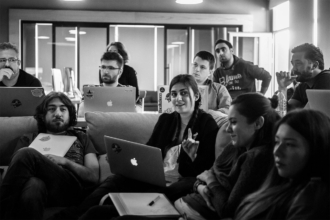I remember the day I decided to quit.
There was nothing momentous about it. It was a regular afternoon, and I was putting in time at a software company I believed in as I had for so many years before. I was writing a line of code when I realized I was half asleep — the kind of tired no amount of coffee could resurrect.
See, I had been toying with the idea of building Jotform for a while, filling my nights and weekends (and, okay, sometimes days) with side-hustling. When I jolted myself awake and double-checked my work, I realized it: This double life was no longer sustainable. It’s not that I didn’t love my job; it’s that working so much wasn’t loving me back.
So I decided, right then and there, to quit.
By traditional wisdom, abandoning my steady, 8–5 job — and the predictable income that came with it — looked a lot like failure. What if my idea for Jotform tanked? What if I looked crazy?
In spite of the counsel of well-meaning friends and family, I persisted with my decision. I just couldn’t shake the feeling that I wouldn’t thrive in my existing role. I wasn’t sure what the future would hold, but I did know one thing: In order to create momentum, I had to stop.
Culture has a way of convincing us that quitting equals failure. If we start something only to stop it days, months, or years later, we’re giving up. But what if quitting is actually meant to keep us from failure? And what if we need it to succeed?
Quitting is in your DNA
I based my decision to leave my job on my passion for building a product that would improve people’s lives, but my other primary clue was the pace at which I was living.
I was on the brink of burnout, living in the gray area between two jobs. I hardly slept. I ate bland, frozen dinners and drank far too much coffee.
As much as my heart was telling me to focus in on Jotform, so was my body — thanks to a survival instinct hard-wired in my brain (and yours, too).
Scientifically, we are wired to quit when we perceive something won’t work out so we can pursue the better option, likely as a survival mechanism. In one recent study, scientists found zebrafish who thought they were moving backward while attempting to swim forward would stop swimming. They realized they weren’t making progress, and that they were just wasting energy.
So they gave up on swimming.
Recognizing an attempt to achieve something isn’t working out, and then stopping that behavior, can be beneficial for us, too — we can both save energy we would have otherwise wasted and identify other routes to success.
Quitting my well-paying, rewarding job wasn’t an easy decision. It certainly wasn’t a practical one.
But it was also the right one — the choice that would lead me to both conserve my energy and create momentum down my own path for success. Or at least, I hoped it would be.
The benefit of strategic quitting
Marketer Seth Godin is a well-known evangelist of “strategic quitting.” The point is that when your effort exceeds the benefit of something, you should consider bailing.
Maybe it’s a bad habit, like chewing your nails or eating junk food. Those examples are obvious.
Maybe it’s something scarier to leave behind, like a job you love or a toxic relationship.
The point is, sometimes, to get ahead and to become the people we want to be, we have to leave things behind.
Think about it: There’s a reason Japanese author Marie Kondo has become such a viral sensation. Encouraging people to get rid of things isn’t just about living in an empty house. It’s about being intentional and filling your home with things you actually love.
As Kondo instructs readers in her best-seller The Life-Changing Magic of Tidying Up,
“Keep only those things that speak to your heart. Then take the plunge and discard all the rest. By doing this, you can reset your life and embark on a new lifestyle.”
The same is true when it comes to our professional and creative lives.
To make space in our lives for what we’ll actually succeed at, we have to take stock and consider what’s burning us out or weighing us down. What is it that’s stealing from you more than it’s giving?
Making quitting work for you
Before you make a decision to call something quits, remember that the purpose of quitting is intentionality, not simply following emotional whims. Leaving something behind should be deliberate. It should be a decision ultimately filtered by your vision.
So, for you, what does that mean?
To quit well, it’s important to determine in advance the conditions that would cause you to quit. You need clear, measurable metrics to know when to give up on your idea.
Godin frequently cites marathoner Dick Collins when teaching people how to quit well. Collins once said,
“Decide before the race the conditions that will cause you to decide to stop and drop out. You don’t want to be there saying ‘Well, gee, my leg hurts, I’m a little dehydrated, I’m sleepy, I’m tired, and it’s cold, and it’s windy…’ and talk yourself into quitting.’”
I’ll be honest: When I left my job, the exhaustion of 80-hour workweeks alone was enough to propel me into action. But the tiredness I experienced wasn’t a momentary feeling, or evidence of one hard day at work.
It was a sign of something much deeper: I was stretching myself too thin. I didn’t have enough energy or innovative ideas to give to both my startup and my current company.
As a service to the software company — and ultimately to myself and the journey ahead — I quit. Leaving my job made logistical sense because I was one person trying to fulfill two roles. But it also aligned with one of my core metrics for decision-making: that burnout was a sign something needed to change.
What do you need to quit?
Maybe there’s something in your life you need to say goodbye to.
Maybe you’re just in the early stages of sketching out your dreams.
Maybe you’re totally content where you are at this moment.
No matter where you happen to be in the journey, consider doing your future self a favor, and take time to carve out what “success” means to you. Because when two roads diverge in the woods later on, you will likely need a roadmap.















Send Comment: